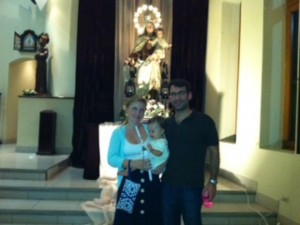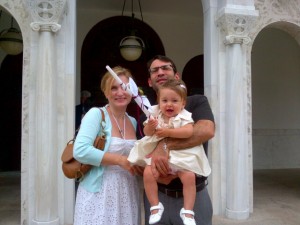
Five minutes before we took over the microphone from the DJ at my daughter’s baptismal reception, we notified her godfather that we expected him to say a few words. He had flown in from Nicaragua, where my husband’s family lives, for the occasion, and in all the preparation we had somehow forgotten to warn him that he’d have to speak.
It was probably unfair to insist that he dredge up some heartfelt emotion on the spot. But it comes with the godfather territory, and, besides, he’s a school principal, he has experience with public speaking.
So when we handed him the microphone, he was ready. He spoke of the honor and responsibility of being a godparent, on behalf of himself and of Amalía’s godmother, my cousin who had come from Greece to take on her godmotherly duties. “We will do our best,” he said, “to help Amalía become a woman of faith.”
At this point, several older Greek ladies in the back of the function room erupted into spontaneous applause. It was a stirring thought—that our eleven-month-old who was just beginning to toddle around the dance floor would grow into a woman of substance. But talk about facilitating someone’s spiritual growth is cheap until you put it to the test. It wasn’t more than a few days later that we called up her godfather and said, “OK, Bucko, put your money where your mouth is.” (We didn’t really say that, but we should have. I feel I don’t use the term “Bucko” enough in my daily parlance.)
See, when my husband waltzed into the state of Massachusetts less than 24 hours before the baptism was about to begin, he informed me that he was going to have to be in Nicaragua the entire following week for work. And if we didn’t go with him, Amalía and I would essentially have been apart from him for most of the month, given other plans that were already in place, and the fact that we’d come up to Massachusetts early to ready the baptism.
So now we were going to be spending the first weekend after Amalía’s baptism in Nicaragua, a country with, to the best of our knowledge, no Greek Orthodox church. And Amalía, like all newly baptized Orthodox babies, was supposed to receive Communion, ideally with a godparent present, for the first three consecutive Sundays following her baptism. “Find a way to get her Communion,” we told her godfather, making it his problem, not ours.
José, Amalía’s godfather, explained that in Catholicism, children don’t receive their first Communion until after they’ve completed a course of study, usually around the age of seven; the sight of a baby receiving Communion would be highly unusual to the parishoners. With the tendency towards hyperbole that seems to characterize both sides of Amalía’s family, José sort of implied that the sight of a little baby receiving Communion might start a riot, or at the very least cause the priest to have a heart attack. But we were adamant about his responsibility to secure Communion for his goddaughter. So at this point, her godfather started acting like THE Godfather, making surreptitious phone calls to engage in top secret negotiations.
He had already found one priest willing to play ball when Mamina, Amalía’s great-grandmother, stepped in and decreed that the monsignor who preached at the church near their house would do it; she’d known him since he was a baby. (I have my suspicions that Mamina runs Nicaragua. When I was choosing what to wear for a holiday party at Christmas, she overruled my husband and mother-in-law in choosing my outfit by saying, “I know the people of my country; this is what they want.” This was a black crepe cocktail dress, and she was right–it was the perfect thing to wear. Now, when dressing, I often ask myself, What Would Mamina Do?)
What we learned upon arriving in Nicaragua and going straight from the airport to Mamina’s was that she had neglected to mention to the monsignor that the little Orthodox girl in need of Communion was a baby; he may have, in fact, been expecting a seven-year-old. At this point, The Godfather stepped in again, going ahead to the church to warn the monsignor that Amalía was powerful, but tres petite.
Shortly after he left, we received a phone call; the monsignor was delighted to offer Amalía Communion and would do so during mass. In fact, he made Amalía’s Communion a focal point of his sermon, explaining to the congregation that Orthodox Christians receive their first Communion during their baptism, and that according to Church law, Orthodox Christians are able to receive Communion in Catholic churches when there is no Orthodox priest present, and vice versa. He took the ruling as a sign of the churches, which were once one and the same, moving closer together.
Unaware of her role as a mediator in the Great Schism, Amalía took Communion like a champ. At the end of the mass, the priest asked everyone to clap for her and she looked around, acknowledging the crowd. Making it all even more special were the facts that it was the saint’s day of the Virgen del Carmen, and Amalía’s middle name is Carmen, after her paternal grandmother; and that Mamina, who could not travel to Boston to attend the baptism, was able to witness Amalía’s Communion.
 Yesterday, a week after the Nicaraguan adventure, was Amalía’s second consecutive Sunday after the baptism, and my husband, mother-in-law and I dressed her in her baptismal finery and headed to Saint Sophia Greek Orthodox Church here in Miami. But with the choir and the cantor both being out of town, liturgy ended early, and by the time we got Amalía (and ourselves) dressed and at church, the moment of truth had already happened and the priest had consumed the remaining Communion. But upon spotting us holding her baptismal candle, he very kindly prepared some Communion from the reserve for Amalía, and she completed her second Sunday. (A note to theologians: web research yields both yes and no answers to the question of can Orthodox and Catholic Christians practice intercommunion when they don’t have access to priests of their own faith, but both the monsignor and the Orthodox priest we spoke to the following Sunday agreed that they could, so we went with that.)
Yesterday, a week after the Nicaraguan adventure, was Amalía’s second consecutive Sunday after the baptism, and my husband, mother-in-law and I dressed her in her baptismal finery and headed to Saint Sophia Greek Orthodox Church here in Miami. But with the choir and the cantor both being out of town, liturgy ended early, and by the time we got Amalía (and ourselves) dressed and at church, the moment of truth had already happened and the priest had consumed the remaining Communion. But upon spotting us holding her baptismal candle, he very kindly prepared some Communion from the reserve for Amalía, and she completed her second Sunday. (A note to theologians: web research yields both yes and no answers to the question of can Orthodox and Catholic Christians practice intercommunion when they don’t have access to priests of their own faith, but both the monsignor and the Orthodox priest we spoke to the following Sunday agreed that they could, so we went with that.)
The experience of finding her Communion in her first few Sundays as a Christian is one Amalía won’t remember, but I hope it’s having an impact on her nonetheless. I hope she’ll retain, on some level, the memory of having met a couple of lovely priests, both Catholic and Orthodox, who facilitated her following her spiritual path. And I’d like her to learn that faith is a moveable feast, that wherever you go in the world (and I’m hoping that for her, that will mean many, many places), you can and should find ways to step out of the activity around you and commune with God, to enact the rituals that give you comfort even if you have to be flexible about the details. To paraphrase e.e. cummings, I hope she’s learning that wherever she goes, God is in her heart; she carries God in her heart.